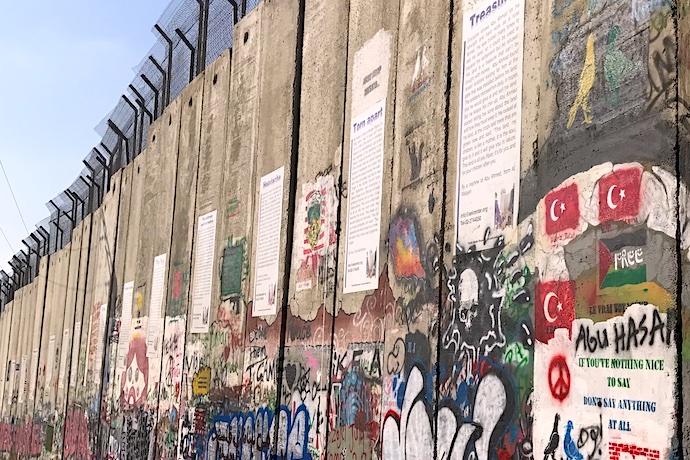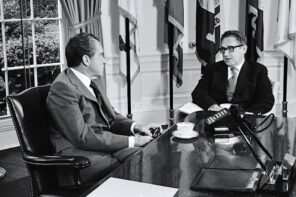“Zionists just want to be happy.” – Hermann Cohen
I do not think it’s provocative to state that liberal Zionism is in crisis. By that I mean that the present iteration of liberal Zionism as a humanistic project of Jewish self-determination based on liberal democratic values is in a defensive mode in light of the realities in the state of Israel, both in its continued—perhaps permanent—occupation/annexation of millions of stateless Palestinians, and in its own self-fashioning, illustrated in part by the 2018 Nation State Law, essentially codifying Jewish supremacy, that cannot be defined as “liberal” by any stretch of the imagination. Many in the Zionist camp celebrate this ethnocentric turn. Most liberal Zionists do not. And yet most liberal Zionists remain steadfast in their defense of the state of Israel.
In a recent piece here on RD, “The Last Licks of Liberal Zionism in America,” Ilan Benattar used the Ben and Jerry’s ice cream kerfuffle this summer as an occasion to observe how liberal Zionism has lost its moorings mostly because its “liberalism” no longer connects in any coherent way to describe what Israel actually is in 2021. At best, Benattar argues, liberal Zionism is stuck in 2010; in the heyday of J-Street; before the acceleration of de-facto annexation; before the 2018 Nation State Law; before liberal Zionism’s most celebrated advocate, Peter Beinart, abandoned two-states; and before five Israeli elections illustrated pretty definitively that Israel is simply no longer a liberal country.
How then, does a professed liberal support a state that is illiberal? Benattar thus claims that liberal Zionism “has fallen into utter incoherence”; that is, its program seems divorced from reality if it still claims to support the actual state that exists, as opposed to some vision of a state that doesn’t. Electoral will matters.
While much of the liberal Zionist literature, especially outside of academe, contests the prognosis of liberal Zionism’s imminent demise, the president of the Shalom Hartman Institute in Jerusalem, Donniel Hartman, recently published an essay “Liberal Zionism and the Troubled Committed” in Sources, the new journal of the Shalom Hartman Institute in Jerusalem. Surprisingly, Hartman does not defend the old program of liberal Zionism, which argues that it has the right ideas but a poor way of conveying them.
In fact, Hartman faces the precipice of liberal Zionism’s future head on. His essay is one of the most honest appraisals of the present state of affairs written by a liberal Zionist that I’ve read. And yet, I think it misses a number of crucial elements—not so much in its diagnostics but in its framing of liberalism and its realistic suggestions for a new liberal Zionist paradigm.
Full disclosure: I’ve known Donniel Hartman for a long time. We always seemed to have affinity and respect for one another’s ideas, even as our differences remain significant. I never quite understood why. After reading “Liberal Zionism” I think I understand. Hartman and I basically agree with two fundamental points: first, that the present reality makes liberal Zionism a hard (if not impossible) sell to those who remain committed to liberalism and democracy. And second, that the responses by the liberal Zionist camp to the present reality are either inadequate or obsolete, in part because they speak from another era, a time before Israel made its “electoral bed,” so to speak, before the 2018 Nation State Law and at a time where the two-state solution was a still a possibility.
Hartman readily grants these points even going as far as to say that while “the facts” liberal Zionists often deploy to make their case may be accurate, they are “the wrong facts…addressing yesterday’s debates.” That is, Hartman argues, correctly in my view, that liberal Zionists haven’t absorbed the extent to which the reality has changed; they’re thinking in an outdated paradigm. They’re essentially defending a state of Israel that no longer exists. Here, he and Benattar would agree. But only here.
To develop his thesis, Hartman presents us with four operative categories to understand today’s engagement with Israel: the “troubled committed” (liberal Zionists), the “untroubled committed” (settler Zionists, or those who have abandoned ethics for power), the “troubled uncommitted” (those whose liberal values have pushed them to resist Israel or reject Zionism), and the “untroubled uncommitted” (those opposed to the state on purely ideological grounds). Hartman claims that the only categories that are viable for him are the two “troubled” ones (committed and uncommitted). While one could quibble about the neatness of these categories, I think they serve his purpose, which is to erect a series of battle fronts for a liberal Zionism in decline.
Ironically, despite Hartman’s viability issue, in a sense, one could argue that the present debate on Israel/Palestine is really between the two “untroubled” categories: settler Zionists (the non-liberal Zionists who support Israel even though it’s a morally compromised ethnonational state), and anti-Zionists (the progressive left that opposes such a state). The “troubled committed,” i.e., the liberal Zionists, have largely been sidelined—and, according to Hartman, for good reason. He wouldn’t say it this way, but one reason may be that liberal Zionism hasn’t had a new idea in almost 40 years.
Troubled Committed = Liberal Zionists Untroubled Committed = Settler Zionists Troubled Uncommitted = Liberals Who Resist Israel or Reject Zionism Untroubled Uncommitted = Ideological Anti-Zionists
Wed irrevocably to the “two-state solution,” liberal Zionists can respond to the present moment in one of two ways; either by claiming that the two-state solution is still viable (a notion that’s becoming increasingly unlikely, even utopian), or that the death of the two-state solution is the fault of the occupied (the old “no partner for peace” canard). Hartman rehearses some of these well-known talking points in his essay but, while he agrees with them in part, he deems them basically irrelevant.
Hartman points to an inherent weakness in the liberal Zionist argument. The “troubled committed,” he argues, is by definition a category that only operates if what troubles the committed is viewed as temporary. That is, the very oxygen of liberal Zionism is the temporary state of the occupation. The more its temporary status is undermined, be it by electoral choices, policies, “facts on the ground,” or political will, some of the “troubled committed” will invariably become the “troubled uncommitted.”
While Hartman laments this fact, he doesn’t deny it, nor does he blame those who move from committed to uncommitted. Permanent occupation, which defines today’s Israel as an illiberal project, easily undermines a Zionist view that remains steadfast in its commitment to liberal values. This is one reason liberal Zionism holds onto the “two-state solution” even as it becomes increasingly fantastical. As an Israeli friend once told me, “The two state solution remains alive mostly to make liberal Zionists in America feel good about themselves. Few in Israel, Jew or Palestinian, really believe it anymore.” In other words, it enables liberal Zionists to remain “troubled and yet committed.”
Not a new reality, a new story
What Hartman is trying to do in his essay is make liberal Zionists relevant again; to make them part of a conversation that now largely excludes them. He argues that liberal Zionists should simply ignore the anti-Zionist “untroubled uncommitted.” While I disagree with his assessment that much of that group traffics in antisemitism (certainly some do) his point is well-taken. Those who are opposed to the state of Israel on ideological grounds will never be convinced by any arguments liberal Zionists have to offer. They will always simply be talking past one another.
However, Hartman claims that liberal Zionism can become relevant again if it wages a battle on two fronts simultaneously: against the morally compromised “untroubled committed” (the settlers and their supporters) and the liberally minded “troubled uncommitted,” those who have abandoned their support of the state based on their liberal values. That is, those who’ve chosen liberalism over what Zionism presently is, viewing the two as increasingly incompatible in the twenty-first century.
Hartman then offers a kind of introduction to a new liberal Zionism, six points that espouse liberal values inside an ethnonational state. What’s perhaps most interesting is what Hartman does not mention in his essay. There isn’t a single mention of “two-states.” I don’t say this critically, but approvingly. Hartman is offering a liberal vision of Zionism in a post two-state reality. The most we get is a “peaceful resolution of the Palestinian conflict” that enables Palestinians to live in “dignity, peace, and security” and “correcting the moral shortcomings of the Occupation as long as it continues.” And then “shrinking the immoral footprint of the occupation.”
These words are carefully chosen. They are in many ways a reflection of the recent writing of Micah Goodman both in his Catch 67 and more recently Wondering Jew. Goodman’s been successful in subtly “moving the goalposts” whereby liberal language is cleverly deployed to support an illiberal reality. “Shrinking the occupation” isn’t ending it. It’s offering a gentler version of its permanence, now couched in liberal language. The intention is on the one hand to undermine the illiberal rhetoric of the “untroubled committed” (the settlers) and appease the concerns of the “troubled uncommitted” by narrowing the chasm between liberalism and permanent occupation.
Before you know it, advocating a gentler occupation is inside the liberal orbit. As Hartman states clearly, “the story of Zionism must be a fundamentally liberal Jewish story.” The term “story” is what’s operative here. Not a liberal reality, but a new liberal “story”—a way of describing an illiberal reality in liberal language. This is because a state of permanent occupation, or de-facto annexation, is not, nor can be, a liberal reality. And as a true liberal, Hartman is aware of that when he writes, “How long can we continue to tell a liberal Zionist story which is at odds with the reality of Israel?”
The honesty of Hartman’s description belies the rhetorical sleight-of-hand of his solution. We change the very parameters of how we define liberalism in Israel/Palestine, and then offer rubrics to apply liberal language inside those new parameters. One can argue that this is merely using liberal ideas to defend an illiberal reality, which in one sense is true. But Hartman is saying more than that. He knows that the reality is illiberal as long as Palestinians are not only treated well but have the same rights of collective self-determination as the Jews, either in two-states or one liberal democracy.
Zionism is a failure on liberal grounds if it cannot offer those who live in the state’s borders the very same rights of self-determination that Zionism claims for Jews. The Nation State Law stuck a dagger into the heart of that premise. But Hartman also knows the political will for Palestinian self-determination is all but extinguished, and his Zionism prevents a liberal democracy because such a state would no longer be a Jewish state.
I say this not only as a critique of Hartman’s approach but also to suggest that he provides an opening to think differently about a reality we both agree on. Hartman is offering a liberal Zionist vision of an illiberal post-two-state reality. That is, one state where Jews continue to dominate on all fronts but where they minimize discrimination and oppression of its non (Jewish)-citizens, i.e. Palestinians.
My question is: maybe there’s no real liberal Zionism because the problem is Zionism itself? Maybe the ideology upon which the state was founded, the ideology—in all its multitudinous facets—that gave birth to the Jewish state, is no longer able to offer solutions to the present reality? This is not unusual.
Manifest Destiny was an engine that drove the American “settler colonial” project but has been replaced with Horace Kallen’s “cultural pluralism,” Kennedy’s “nation of immigrants” and later multiculturalism. Manifest Destiny was, and remains, an ideology of racism and discrimination. Yes, white supremacists still hold Manifest Destiny as its ideological foundation, but these old illiberal ideas are justifiably under attack in the continued culture wars of twenty-first century America, as they should be. Manifest Destiny today has become the provenance of the far right in America, while liberal and progressive Americans have rejected it out of hand. Yet ironically, the illiberal Zionism of the “untroubled committed” now rules the state of Israel. Hartman may not be able to change that reality, so he wants to change the story.
Is it possible, today, for one to not be a Zionist and still be pro-Israel? Can Israel be a state where Jews have autonomy and partial sovereignty but not be a Jewish state? That is, can one re-conceptualize Israel as a state of all its citizens without undermining the right of Jewish self-determination? I think so, and as Israeli historian Dmitry Shumsky has shown in his book Beyond the Nation State, many early Zionists thought so as well.
Various recent theories have been suggested, many by people who consider themselves Zionists. Ian Lustik’s Paradigm Lost offers ways to restructure Israel’s political institutions to enable a one-state reality that can maintain equal rights for two peoples. Omri Boehm’s Haifa Republic puts forth an interesting theory of shared sovereignty and dual autonomy whereby Jews would sacrifice part of their sovereignty to enable Palestinians to have true political autonomy in one state. Other theories of a Jewish-Arab confederation exist as well.
Liberal Zionists have often mostly dismissed such ideas as “fantasy.” But one of Hartman’s contributions here is that two states may be just as fantastical. Liberal Zionism is no less utopian than progressive one-statism. Hartman’s alternative is to apply a new version of liberalism, a “Jewish liberal story,” to the present reality in a way that minimizes the hyper-nationalist underbelly of Zionism, its Manifest Destiny, embodied in the “untroubled committed.” But in doing so it perpetuates the illiberal nature of the state, an ethnostate with a permanent, illegal, and immoral occupation. A new vision for Israel is necessary as Hartman makes quite clear. My question is: is Zionism getting in the way? My answer suggests that yes, it is.





